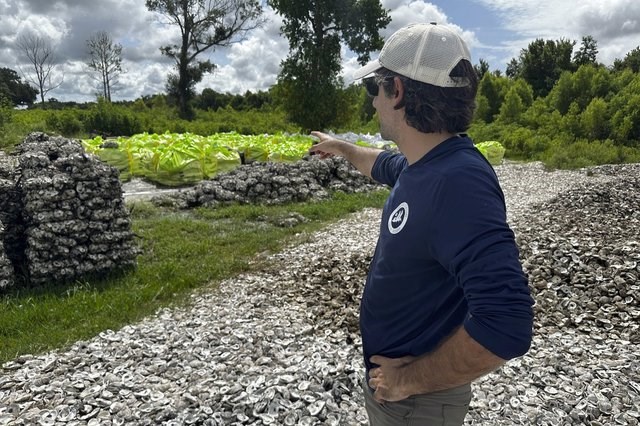VIOLET, La. (AP) — A volunteer-heavy effort to restore some of Louisiana's eroding coast with recycled oyster shells was part of the scenic backdrop Wednesday for a visit from the head of AmeriCorps, the federal agency that deploys volunteers to serve communities around the nation.
Michael Smith, the CEO of AmeriCorps, visited a storage area in the town of Violet, where he got a look at piles of oyster shells, many collected from Louisiana restaurants. They are being gathered and stored by the nonprofit Coalition to Restore Coastal Louisiana, which uses them to build reefs along the vulnerable coast. The new reefs also provide new breeding ground for more oysters.
Smith used the visit not only to boost the oyster recycling effort but also to tout the importance of volunteer efforts in the area nearly 19 years after Hurricane Katrina devastated parts of the Louisiana and Mississippi coasts.
“It's so important to be here today because what we see here is that not only did those folks make a difference back then, 19 years ago, but they've stayed in the community. They continue to be involved,” Smith said in a later interview.
Smith said it is not unusual for AmeriCorps volunteers to get involved long-term in the communities they serve.
As he spoke, an example was playing out to the southwest in coastal Terrebonne Parish, where dead or dying “ghost trees” along the bayous are signs of saltwater intrusion from the Gulf. It is where 26-year-old Fiona Lightbody, now with the Coalition to Restore Coastal Louisiana, was part of the ongoing effort to rebuild oyster reefs for the Pointe-au-Chien tribe.
“By putting shells back in the water, we’re helping to support the oystermen and the oyster fisheries that are really critical to life down here and helping provide habitat for new oyster growth,” Lightbody said.
Lightbody joined the project as an AmeriCorps member and now coordinates the coalition's shell recycling program. “It was like a dream to stay on,” she said. adding, “Most of our staff at one point did AmeriCorps.”
AmeriCorps efforts were especially important after Katrina. The agency said 40,000 volunteers provided a combined 10 million hours of service, including running shelters and food pantries, gutting houses and managing donations.
Today, Smith said during an interview in Violet, efforts like the oyster reef program show that AmeriCorps isn't just a disaster recovery operation. “We're there for resilience,” he said. “And we are there for the long haul.” ___ This story has been corrected to show the name of the tribe is spelled Pointe-au-Chien, not Pointe-aux-Chien.
___
Brook reported from Terrebonne Parish, Louisiana.
Stephen Smith And Jack Brook, The Associated Press




